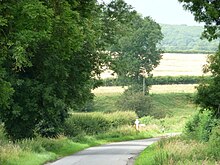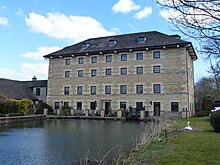| Gwash | |
|---|---|
 The Gwash at Manton, before it enters Rutland Water The Gwash at Manton, before it enters Rutland Water | |
 | |
| Location | |
| Country | England |
| Counties | Lincolnshire, Rutland, Leicestershire |
| Physical characteristics | |
| Source | |
| • location | Knossington |
| • coordinates | 52°40′20″N 0°49′13″W / 52.672149°N 0.820308°W / 52.672149; -0.820308 |
| • elevation | 168 m (551 ft) |
| Mouth | River Welland |
| • location | Stamford |
| • coordinates | 52°39′15″N 0°27′02″W / 52.654065°N 0.450421°W / 52.654065; -0.450421 |
| • elevation | 19 m (62 ft) |
| Length | 39 km (24 mi) |
| Basin features | |
| River system | River Welland |
| Tributaries | |
| • left | North Brook |
The River Gwash, occasionally Guash, a tributary of the River Welland, flows through the English counties of Leicestershire, Rutland and Lincolnshire. It rises just outside the village of Knossington in Leicestershire, near the western edge of Rutland. It is about 39 kilometres (24 mi) long.
Course

The source of the river is just north-west of the village of Knossington, but the Gwash is formed of several small headwaters that come together near Braunston-in-Rutland before passing the site of Brooke Priory at SK847062 and running westward to pass under the railway northwest of Manton (SK876052).
The Gwash then helps to fill the Rutland Water reservoir which was formed by damming its valley at Empingham. From the reservoir a controlled flow is released to maintain the flow around Tolethorpe Hall, Ryhall and Stamford and into the River Welland. The flow is enhanced by the Gwash's tributary, the North Brook, at SK956083 in Empingham, which significantly helps maintain riverlife.
East of Stamford, its course is now fixed, but it lies in a small flood plain which shows clear signs of the river's former meandering. The pasture fields include depressions that fill during wet seasons, forming oxbow lakes, though they are not of the classical shape. Near Stamford it is the parish boundary between Stamford and Uffington.

West of Stamford, the Gwash crossed the Stamford Canal, requiring some elaborate hydraulic works. Although the canal has been dry for over a century, the Borderville weir has only just been removed, and some meanders re-watered.
The river feeds the millpond at Newstead Mill in the parish of Uffington before entering the Welland at Newstead Bridge just east of Stamford. The confluence was restored in 2021 by the Welland Rivers Trust.
Wildlife
The river supports a wild variety of fish species, including grayling and trout. Chub and dace inhabit the lower length below Newstead bridge in Stamford.
Attempts have been made to re-introduce water voles in the area. There are also concerns about non-native signal crayfish becoming dominant in the river, and reports of a deliberate introduction. The river has formed part of pilot trials of means to control that population.
Etymology

The gw- opening is unknown in Old English but common in Brythonic languages such as modern Welsh. As such many words containing this element are borrowed into English, with the gw- becoming w-. The earliest recorded form of the name was "le Whasse" (c. 1230), with the modern spelling Gwash first recorded in 1586, with William Camden also using this spelling in his work Britannia, in the following century.
Most etymologists believe that the original name was Old English, with the word (ge)waesc (a washing, a flood) being suggested as a possible derivation.
In literature
Local poet John Clare wrote a sonnet about the Gwash, published in Poems Descriptive of Rural Life and Scenery (London, 1820):
Where winding gash wirls round its wildest scene
On this romantic bend I sit me down
On that side view the meads their smoothing green
Edg'd with the peeping hamlets checkering brown
Here the steep hill as dripping headlong down
While glides the stream a silver streak between
As glides the shaded clouds along the sky
Brightning & deep'ning loosing as they're seen
In light & shade—so when old willows lean
Thus their broad shadow—runs the river bye
With tree & bush repleat a wilderd scene
& mossd & Ivyd sparkling on my eye—
O thus wild musing am I doubly blest
My woes unheeding—& my heart at rest.
References
- Wheeler and Batty (1896), p.291
- ^ "The Guash fishing club". Guash fishing club.
The River Guash or Gwash (the u is an ancient spelling) is a small limestone trout stream that runs in the valley from Braunston-in-Rutland to where it joins the Welland just downstream of Stamford.
- Page, William, ed. (1935). "Parishes: Brooke". A History of the County of Rutland: Volume 2. Victoria county history. pp. 37–40. Retrieved 18 January 2016.
- "A history of Rutland Water" (PDF). Anglian Water. June 2009. Archived from the original (PDF) on 24 January 2013. Retrieved 26 May 2013.
- "River Gwash, Rutland". News. The wild trout trust. Retrieved 26 May 2013.
- "Update on the 'Wash to the Guash' sea trout project being carried out by the Welland rivers trust". Club news. Guash fishing club. Archived from the original on 7 July 2013.
- "Gwash Welland Confluence Project". Welland Rivers Trust. Retrieved 9 November 2021.
- "Returning Ratty to our rivers comes at a price - removal of the American mink". Leicester Mercury. 7 January 2011. Retrieved 26 May 2013.
- Peay, Stephanie (2001). "Eradication of alien crayfish populations" (PDF). Environment Agency. Retrieved 26 May 2013.
- Ekwall, Eilert (1928). English River-names. Clarendon Press. p. LXXV.
- Coates, Richard; Breeze, Andrew; Hôrôwîṣ, Dāwid (2000). Celtic voices, English places: studies of the Celtic impact on place-names in England. Stamford: Shaun Tyas. p. 256. ISBN 9781900289412.
- The Place-Names of Rutland by Barrie Cox (EPNS, 1994), p2
Bibliography
- Wheeler, William Henry; Batty, Leonard Charles (1896). A History of the Fens of South Lincolnshire. British Library Historical Print Collections. ISBN 978-1-241-32839-9.
External links
![]() Media related to River Gwash at Wikimedia Commons
Media related to River Gwash at Wikimedia Commons